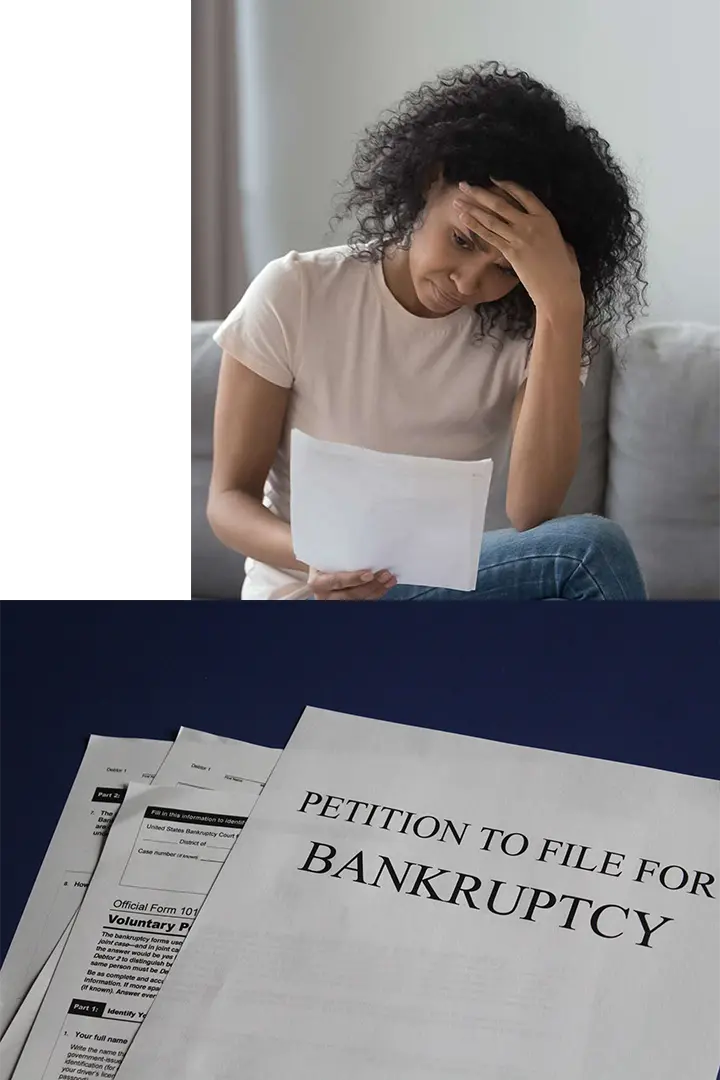Bankruptcy
Whether you’ve experienced a health emergency that required expensive medical treatment, your business failed, or you were unable to pay back loans, you may need to consider declaring bankruptcy.
Bankruptcy can help you start over, free from your debt.
Although many fear the term, declaring bankruptcy can help you start over, free from your debt.
Filing for bankruptcy will stop repossessions, foreclosures, harassing phone calls, wage garnishments and lawsuits. The team at LaPlante Faulkner Wilson Murphy & Clay, LLC will help you navigate the decision of which type of Bankruptcy, if any, is right for your unique financial situation. Our goal is to make sure you understand if Bankruptcy can improve your situation.


Types of Bankruptcy
- Chapter 7, or liquidation bankruptcy, means the court will sell your possessions to pay off as much of your debt as possible. After this process, your debts are discharged.
- Chapter 11 is only available for businesses and is often called a reorganization bankruptcy. If you own a business and fear insolvency, ask your lawyer about chapter 11.
- Chapter 13 is for individuals and businesses and involves a repayment plan ordered by the court, usually over five years.

Understanding Bankruptcy Exemptions in Alabama: Protecting Your Assets During Bankruptcy
Bankruptcy exemptions in Alabama allow individuals filing for bankruptcy to protect certain assets from creditors, ensuring they do not lose everything in the process. When filing for bankruptcy, individuals can choose between Chapter 7, which involves liquidating assets to pay off debts, or Chapter 13, which sets up a repayment plan over time. Exemptions exist to prevent people from being left with nothing, allowing them to keep essential property like their home, some personal belongings, and a portion of their income. The Alabama Homestead Exemption protects up to $15,000 of real estate equity for individuals and $30,000 for married couples. Personal property exemptions include essential household items, certain work tools, and a wildcard exemption of up to $7,750 per person for additional assets. Some wages, pensions, and public benefits are also safeguarded under Alabama law.
Unlike some states, Alabama does not allow the use of federal bankruptcy exemptions; individuals must rely solely on state-specific protections. To qualify for these exemptions, a person must have been a permanent Alabama resident for at least two years before filing. The state periodically adjusts exemption amounts for inflation, and in some cases, judges have discretion to modify exemptions based on individual circumstances. Businesses filing for Chapter 7 bankruptcy, however, cannot claim exemptions, as all assets are either sold or returned to creditors. Understanding these laws and consulting with a bankruptcy attorney is crucial to navigating the process effectively and making informed financial decisions.
Contact Our Law Firm
If you live in Alabama and believe you cannot pay your debts, contact the experienced legal team at LaPlante Faulkner Wilson Murphy & Clay, LLC. We can help you determine if bankruptcy is the best option for you, and if so, which chapter to choose.
Call us at (256) 236-7354 to schedule a consultation and learn more about bankruptcy and how it can affect your life.
